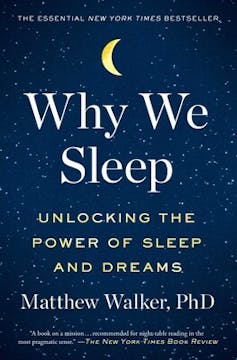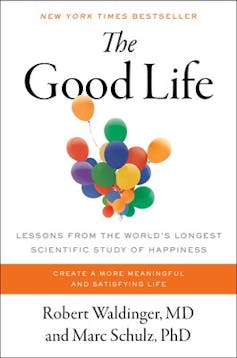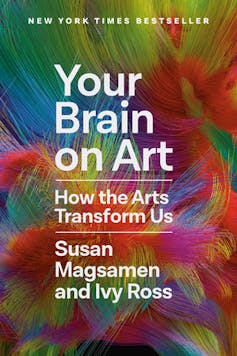Summer reading: 4 feel-good books you can rely on

Not all self-help books are based on science, and sifting through such a large number of books can be challenging. (Shutterstock)
by Joanna Pozzulo, Carleton University
In a survey on views on health and well-being, almost all Canadians said they wanted to improve their personal well-being.
There’s arguably no better time to reboot your personal wellbeing than the summer months. A book filled with information on improving your wellbeing can be the push you need to get your wellness journey started.
Books can enrich and improve the lives of their readers. About half of all Canadians read or listen to a book once a week, while over 30 percent say they read daily.
This is good news because reading is linked to several health benefits, including reducing stress, slowing cognitive decline, increasing well-being and improving sleep quality.
Self-help reading in the group
Being part of a community increases wellbeing, reduces social isolation and increases connectedness. For many, reading is a solitary activity, but it is also possible to read as part of a community.
Book clubs can promote the benefits of reading And Community. There are various formats for book clubs, including in-person meetings, electronic discussion platforms, or a combination of both.
Over 15,000 books are published each year in the self-help category. Not all self-help books are based on science, and it can be challenging to wade through so many books. So what should you read?
Evidence-based books on well-being
For anyone looking for a curated list of evidence-based books on different dimensions of well-being, I founded the Reading for Well-being Community Book Club, housed in the Mental Health and Well-Being Research and Training Hub at Carleton University.
The book club, which is open to readers inside and outside Carleton University, uses a digital platform to publish book selections and reviews where members can communicate. Book club members receive a monthly newsletter informing them of the new book selection, the review, and some questions about the book for the electronic discussion forum.
Each month I select and review a science-based book aimed at improving well-being. This selection is chosen as Professor Pozzulo’s pick. Here are four evidence-based books to help you get your personal well-being back on track this summer:
Why we sleep: Unleashing the power of sleep and dreams by Matthew Walker (2017, published by Simon & Schuster).

(Simon & Schuster)
If you want to better understand sleep patterns, their function, and their role in well-being, Walker, a professor of neuroscience and psychology at the University of California, Berkeley, offers a description of work in this area.
If you’re looking for a list of strategies for better sleep, Walker also provides those in the appendix of the book. Walker taught me to think about sleep and, more importantly, to realize that sleep is necessary for better well-being.
The Good Life: Lessons from the World’s Longest Scientific Study on Happiness by Robert Waldinger and Marc Schulz (2023, published by Simon & Schuster).

(Simon & Schuster)
Over 80 years (and counting), participants and their families have been extensively studied across the life course. Waldinger, clinical professor of psychiatry at Harvard Medical School, and Schulz, professor of psychology at Bryn Mawr College, conclude that relationships are fundamental to well-being and that improving your relationships is possible at any stage of life.
The authors not only give you a glimpse into the lives of some of their participants, but also offer you practical exercises to help you improve the quantity and quality of your relationships.
Your Brain and Art: How the Arts Change Us by Susan Magsamen and Ivy Ross (2023, published by Penguin Random House).

(Penguin Random House)
The authors explore the field of neuroaesthetics, the scientific study of how the arts can change the brain, body and behavior, and note that doctors now write social prescriptions for things like visiting a museum or taking a walk in the park.
This book offers a fascinating exploration of how the arts can be used to positively impact well-being, improve overall health, and help communities thrive. The authors offer several suggestions for how to incorporate the arts into your daily life to increase your well-being. Magsamen is the founder and executive director of the International Arts + Mind Lab at the Johns Hopkins University School of Medicine. Ivy Ross is the vice president of hardware design at Google and previously worked as a jewelry designer.
The Anxious Generation: How Childhood Restructuring Is Causing an Epidemic of Mental Illness by Jonathan Haidt (2024, published by Penguin Random House).
This is an important book that explores the connection between the increasing use of social media and the state of mental health. This book is not just for parents, but for anyone who wants to understand the evolving interplay of these issues.
Haidt offers several suggestions that can be implemented almost immediately to
Reduce the negative impact of social media on the developing brain. Haidt is a social psychologist and professor of ethical leadership at New York University’s Stern School of Business.
To sign up for the book club you can click here.
Happy reading!
Joanna Pozzulo, Chancellor Professor of Psychology, Carleton University
This article is republished from The Conversation under a Creative Commons license. Read the original article.



